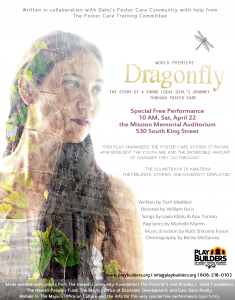
It Takes an 'Ohana
Hawaii's Foster Care ResourceIt Takes an ‘Ohana is a program of Family Programs Hawaii. We provide the latest news in foster care and updates to Hawaii’s child welfare laws. For more information on foster care and strengthening families in Hawaii, visit our main website by clicking the button below.
Dragonfly: The Journey of a Young Local Girl in Foster Care
 PlayBuilders of Hawaiʻi Theater Company’s play, Dragon Fly: The Journey of a Young Local Girl in Foster Care, was written by Terri Madden in collaboration with Hawaii’s Foster Care Community, with music by Apu Turano and Layla Kilolu (rap lyrics by Michelle Martin) and is directed by William Haʻo. It tells the story of several former foster youth’s experience in the system and the struggles they dealt with regarding family, life, love and forgivenss. It is beautifully done – please be sure to see it!
PlayBuilders of Hawaiʻi Theater Company’s play, Dragon Fly: The Journey of a Young Local Girl in Foster Care, was written by Terri Madden in collaboration with Hawaii’s Foster Care Community, with music by Apu Turano and Layla Kilolu (rap lyrics by Michelle Martin) and is directed by William Haʻo. It tells the story of several former foster youth’s experience in the system and the struggles they dealt with regarding family, life, love and forgivenss. It is beautifully done – please be sure to see it!
Performances Include:
Where: Dots in Wahiawa WHEN: May 6th at 7:00 p.m. COST: Free
Where: The ARTS at Marks Garage WHEN: May 18, 19, 20, 21, 25, 26, and 27 at 7 pm COST: Tickets $15 and $12
Where: New Hope Leeward WHEN: May 28 at 6:00 p.m. COST: Free
About the Play
This play is based on stories shared by the foster care community during story circles and individual interviews conducted by Madden with the PlayBuilders Ensemble from January to December of 2016. Community Collaborative playwright, Terri Madden holds an MFA in Theatre (Playwriting focus) from UH, and has lived on and off in Honolulu since 1973, when her Army officer father was transferred here. Plays include Clinchco, The Day After Payday (Ralph Stanly Traditional Mountain Music Center, Clintwood VA), Appalachia, Hawaii (Earl Ernst Theatre, University of Hawai) Wahiawa, Remembah Wen (Dots Restaurant, Wahiawa), Yes, I Am, Stories from Honolulu’s LGBT Community (Fresh Café/ devised with Ronald Gilliam and Kahana Ho), and Yes, I am Leeward Edition (Leeward Community College/ devised with Ronald Gilliam and Kahana Ho). A 45-year veteran of the theatre, Terri is a recipient of Lisa Toshigawa Inouye Award for Excellence in Playwriting, and is a multiple Po’okela Award winning actress for performances in both straight plays and musicals. For the 2013-2014 season, Terri was acknowledged by the Hawaii State Theatre Council with a Po’okela Award for directing “Houseless in Paradise” which was also selected as “Overall Play.”
Director, William Haʻo, has been a professional actor for over 25 years. Based in New York City, he has performed for many of NYCs’ theater companies and has toured in almost every state of the Union, with performances also in Vancouver, Canada, and Athens, Greece. His work includes various voiceovers for documentaries. He narrated the award-winning documentary On the Move: The Central Ballet of China. Since returning home he has performed with Loʻi Theatre, Kumu Kahua Theatre, and the Oral History Department at UHM. For Hawaii Mission Houses (HMH), Will directed Twelf Nite O Wateva and has also directed their Cemetery Pupu Theatre series, and The Complete Works of William Shakespeare (Abridged) last summer. He was last seen on stage at Hawaii Theatre Center’s production of Eddie Wenʻ Go, The Story of the Upside Down Canoe, by Marion Lyman-Mersereau.
PlayBuilders’ mission is “to gather and share real stories that resonate with, empower, and connect individuals throughout the culturally rich and diverse communities of Hawaiʻi.” PlayBuilders prides itself for being a multi-ethnic ensemble of experienced theatre makers who help Hawaii’s communities explore their identity, history, peoples and cultures through theater. As Founder and Executive Director, Terri Madden notes: “Our original works are based on shared stories, and feature community members performing alongside our experienced actors. PlayBuilders’ productions are presented in places meaningful to community members and the public is invited to attend, thus providing connections of understanding and friendship between all of Hawaii’s people.
More Articles
2013 Annual Child Welfare Law Update Conference
Follow this link for information and handouts from the 2013 Annual Child Welfare Law Update Conference.
`Ohana is Forever VII
Follow link for handouts and links to information given at the `Ohana is Forever VII: H.O.P.E. – Honoring Our Path to EmpowerMEnt Conference.
Foster Care Extended to Age 21 in Hawai`i
Gov. Neil Abercrombie signed Senate Bill 1340 into law July 1, 2013 at the State Capitol before an audience that included politicians, policy makers and youth advocates, the young and old alike. SB 1340, now Act 252, extends voluntary foster care to age 21 in Hawai`i. Follow link for more info.
